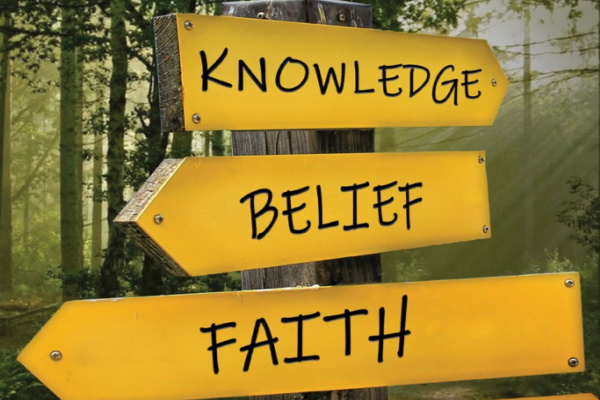Question
How do belief, faith and knowledge relate to each other?
Val
Answer
Val,
To grasp the intricate relationship between belief, faith, and knowledge, it is essential to define each term clearly:
- Knowledge is defined as information gained through experience or education. It encompasses an understanding of facts and truths. For instance, knowing what a chair is based on its characteristics allows us to recognize it when we see one.
- Belief is the acceptance that something is true or exists. It is built on knowledge; for example, we believe in the existence of chairs because we know what they are and have experienced them.
- Faith is a deeper trust or confidence in someone or something, often without the necessity of empirical evidence. Faith involves a reliance on beliefs and knowledge, functioning like a bridge between what we know and what we hope or trust. A useful analogy is that of a person sitting in a chair: they know what a chair is (knowledge), they believe it will hold their weight (belief), and they act by sitting down (faith).
The Church of Jesus Christ of Latter-day Saints emphasizes the interconnectedness of faith, belief, and knowledge:
In the article “Strengthen Faith as You Seek Knowledge,” Elder Quentin L. Cook explains that faith and knowledge are not inconsistent; rather, they are compatible and complementary. He states, “We cannot expect to have faith at the center of our lives if all of our efforts are expended on knowledge, sports, hobbies, making money, or other pursuits.”
The Church teaches that faith is not a perfect knowledge of things. As stated in the scriptures, “Faith is not to have a perfect knowledge of things” (Alma 32:21, Ether 12:6), indicating that faith is essential even in the absence of complete knowledge.
The concept of seeking knowledge diligently and humbly is stressed, reminding us that “to be learned is good if they hearken unto the counsels of God” (2 Nephi 9:28–29). This shows that acquiring knowledge should be done with a humble heart and a willingness to follow divine guidance.
Incorporating personal experiences into our understanding of belief, faith, and knowledge is crucial. Elder Dennis B. Neuenschwander emphasizes this connection, stating, “Believing what we know has to do with recognizing, trusting, and learning from our own spiritual experiences.” These experiences help solidify our beliefs and foster a deeper faith, as they serve as tangible evidence of God’s influence in our lives.
An essential aspect of faith in the Church is that it begins with belief but extends beyond mere acceptance. True faith is active, implying that belief alone is insufficient without corresponding actions. As noted, “Faith in Christ comprises belief in Him, combined with trust in Him. One cannot have faith without belief, yet he may believe and still lack faith.”
This active nature of faith leads to good works and the potential to receive divine blessings and knowledge. Elder Cook also emphasizes that personal testimony is vital for making informed choices, stating, “The foundation for every important decision and choice you will make is your testimony of Jesus Christ and the Restoration of His gospel.” This personal conviction can guide individuals through life’s uncertainties and challenges.
In conclusion, the relationship between belief, faith, and knowledge within The Church of Jesus Christ of Latter-day Saints is intricate and deeply enriching. These elements are interwoven, each playing a crucial role in the journey of spiritual growth. Faith is not merely a passive acceptance of beliefs; it is an active trust that invites knowledge and prompts action. By understanding and nurturing this relationship, individuals can enhance their testimonies, deepen their understanding of the gospel, and strengthen their connection with God.
As we strive to align our beliefs with our knowledge and exercise our faith in meaningful ways, we pave the way for personal revelation and spiritual enlightenment. Let us commit to seeking knowledge with a humble heart, trusting in the divine guidance of the Holy Ghost, and acting in faith to foster a deeper relationship with our Savior, Jesus Christ.
Gramps







